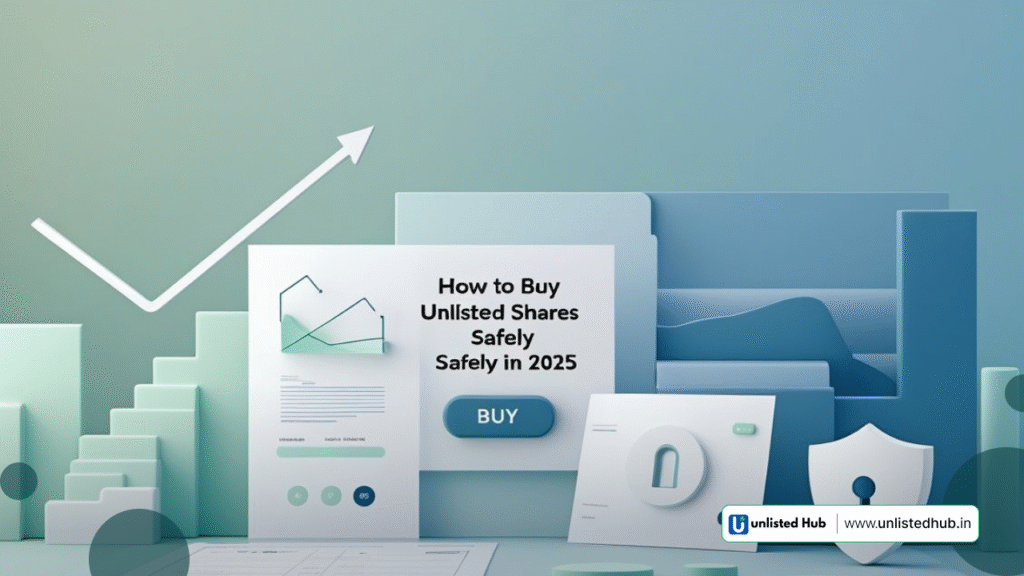Section A: Overview of Unlisted Stocks
Stocks of businesses that are not traded on standard stock exchanges, such as the NSE or BSE, are known as unlisted shares. These businesses are private, and the private transactions or specialised platforms are used to buy and sell their shares.
In India, unlisted shares are becoming more and more popular, particularly among retail investors who want to get in on businesses before they go public. When the company intends to list soon, these shares are also referred to as pre-IPO stocks.
~ What Are Unlisted Shares? – Quick Overview
| Point | Details |
| Meaning | Shares of private companies not listed on NSE/BSE |
| Where to Buy | Through brokers, platforms, or private deals |
| Why It’s Popular | Early investment opportunity before IPO |
| Risk Level | Higher than listed stocks due to low liquidity |
| Returns Potential | Can be very high if company grows or gets listed |
~ Key Highlights
- Not listed on stock exchanges.
- Accessible via brokers or private networks.
- Frequently consists of expanding startups or well-known brands prior to an IPO.
- Requires research before making an investment.
Section B: What Are Unlisted Shares and Why Are They Gaining Attention in 2025?
Unlisted shares are stocks from companies that do not trade on stock exchanges like the NSE or BSE. These companies are private, and their stocks are bought and sold in the unlisted market, often before they go public.
In 2025, more investors are interested in unlisted stocks because they provide early access to high-growth businesses, offer better prices, and raise awareness of pre-IPO stocks.
~ What Makes Unlisted Stock So Popular in 2025?
| Aspect | Details That Matter to Investors |
| What are Unlisted Share? | Shares of private companies not listed on any stock exchange |
| Who Offers Them? | Startups, growing private firms, and soon-to-be public companies |
| Why is 2025 Hot? | Rise in IPO announcements and tech-driven growth stories |
| Who Can Buy Them? | HNIs, retail investors, and institutional buyers via trusted platforms |
| How to Profit? | Buy at lower valuation and sell post-listing at higher market price |
~ Key Reasons Why Unlisted Shares Are in Demand
1. Early Access to Growth:
-> Investors can buy in before the company becomes well-known or overpriced.
2. Better Valuations:
-> They are usually priced lower than the expected IPO price.
3. Upcoming IPOs in 2025:
-> Several big names plan to go public this year.
4. Long-Term Potential:
-> Good companies can provide strong returns if held for 2 to 3 years.
5. Diversification:-
-> This allows investors to spread risk beyond traditional stock portfolios.
~ Quick Highlights
- Unlisted share are stocks from private companies not traded on exchanges.
- In 2025, these stocks are gaining popularity due to IPO excitement, better returns, and access to pre-IPO stocks.
- Anyone can invest through verified unlisted share platforms.
Section C: Where and How to Buy Unlisted Shares in India
Unlisted shares are the share capital of unlisted companies, which have not listed their shares in any stock exchange, i.e., NSE or BSE. These shares are traded privately and are becoming popular among retail investors seeking early-stage investments.
If you are wondering where and how to buy unlisted share in India, the process is simple to accomplish, but only if you go through the right channels.
~ Platforms Where You Can Buy Unlisted Stocks
| Platform Type | What It Offers |
| Unlisted Share Dealers | Direct purchase from bulk sellers or employees of private companies |
| Online Marketplaces | Verified portals like UnlistedHub |
| Wealth Management Firms | Personalized access through PMS or family offices |
| Depository Participants (DPs) | Transfer of unlisted shares through NSDL/CDSL with proper demat formalities |
| Employee Stock Options (ESOP) | Buying ESOPs from employees of startups or private firms |
~ Steps to Buy Unlisted Share in India
- Choose a well-known unlisted share platform, like UnlistedHub or a legitimate dealer.
- Research the history of the company, including its financials and chances of an IPO in the future.
- Negotiate price based on current market sentiment or grey market rates.
- Keep proper documents, such as PAN, demat details, and an agreement in your possession.
- Pay and demat transfer through CDSL or NSDL modes.
- Monitor holdings through your demat account, the same way you would follow regular listed shares.
~ Things to Remember
- Unlisted share are less liquid, hence invest for a longer term.
- Don’t purchase from untrusted brokers or telegram groups.
- Verify if the firm is likely to go public, like their IPO intentions.
- SEBI does not regulate pricing, so make your own valuation research.
By taking the right process, you can buy unlisted shares in India securely and with low risk. Always cross-check with experts and make use of only genuine sources so that you won’t be the victim of fraud.
Section D: Top Benefits of 2025 Unlisted Share Investment
Unlisted shares are gaining huge popularity in 2025 as retail and HNI investors look beyond the traditional stock market for better returns and early investment in growing companies. The shares of such companies not listed on NSE or BSE but with high growth potential, especially since they have imminent plans to list themselves, are being sought after by investors.
If you are an individual stepping into new possibilities with longer-term benefits, this may be the ideal choice.
~ Key Benefits at a Glance
| Benefit | What It Means |
| Early-Stage Entry | Invest before IPO and potentially gain higher returns post-listing |
| High-Growth Potential | Many startups in unlisted space scale rapidly before going public |
| Diversification | Reduces risk by adding private equity to your traditional stock portfolio |
| Valuation Advantage | Entry at lower valuations compared to post-IPO pricing |
| Limited Market Volatility | Less affected by daily market fluctuations of NSE/BSE stocks |
| Exclusive Access | Gives access to niche companies not yet available to the public |
~ Why More Investors Are Turning to Unlisted Shares in 2025
More and more investors increasingly look for assets that are not exposed to the noise of the stock exchange. That is where unlisted share reign supreme.
By entering the market before a company goes public on the stock exchange, you gain:
- Access to high-potential startups and mature private companies through private investment.
- Reduced daily price fluctuations since they’re not frequently traded on open markets.
- Attractive entry point – usually available at a lower valuation than the eventual IPO price.
- Reduced correlation with listed equities, adding diversity to your portfolio through better risk balance.
- Opportunity to invest in companies such as NSE, NSDL, boAt, and OYO before they go public.
When you invest in unlisted shares, you’re effectively stepping into a market where the smart money already is on the move — like institutional investors, VC players, and high-net-worth individuals.
The majority of these companies have sound financials, sector placement, and definite IPO plans. For retail investors who do their research, this space offers a good chance to catch the wave early and potentially attain peak wealth in the long run.
Whether you’re building a diversified portfolio or seeking high growth bets, unlisted share can give you that something extra in 2025.
Section E: Risks and Precautions Before Investing in Unlisted Stocks
Unlisted shares are the equity holdings of companies that are not available for trading on public stock exchanges such as NSE or BSE. Although they can yield high returns, particularly if the company is listed later, they also have some risks that you need to know beforehand before you invest.
Most new investors dive in without knowing the whole story — and that can be expensive. These investments are much different than purchasing stock that’s available on the market.
~ Key Risks in Unlisted Share
| Risk Type | What It Means (In Simple Terms) |
| Low Liquidity | It’s not always easy to sell your shares quickly. You may have to wait or sell cheap. |
| Limited Company Info | These companies don’t publish detailed data like listed ones. Hard to track performance. |
| Unclear Valuation | No real-time price updates. You may not know if you’re paying too much. |
| IPO Uncertainty | Just because they plan an IPO doesn’t mean it will happen soon — or at all. |
| Regulation Risk | Rules around unlisted share may change anytime. It can affect your investment. |
~ Safety First: Precautions to Take Before Investing
1. Research First:
-> Always verify who owns the company, how long it’s been operating, and how it makes money. A good reputation translates to less risk.
2. Request Financial Records:
-> You must be able to view profits, losses, debt, and growth strategies before you invest. If a company does not want to reveal these, it’s a red flag.
3. Invest on Safe Platforms:
-> Buy only from reliable sources such as SEBI-registered brokers or secure online websites. Never trade with someone unknown who offers high returns.
4. Review Lock-In Clauses:
-> Certain shares may be locked once listed. Understand the waiting period before selling, particularly with popular IPOs.
5. Don’t Put All in One Basket:
-> Divide your money into various options to minimize risk. Avoid investing your entire amount in a single company.
6. Consult a Tax Advisor:
-> Particularly if investing a large sum — tax on unlisted share is handled differently. Knowing the rules spares you trouble down the line.
7. Don’t Get Caught Up in Hype:
-> Unique Version with the Same Meaning. Focus on long-term goals and avoid making impulsive decisions based on emotions.
~ Frequent Mistakes Investors Make When Handling Unlisted Share
Even seasoned investors occasionally make mistakes when investing in unlisted share. Having knowledge of such mistakes can prevent you from making them and wiser choices.
1. Failure to Verify Exit Options:
-> Most investors invest without inquiring about how and when they can liquidate. Focus on long-term goals and avoid making decisions based on emotions.
2. Going with the Crowd:
-> Just because everyone is purchasing a company’s unlisted stocks doesn’t necessarily mean they are best for you. Go with facts, not with trends.
3. Missing Due Diligence:
-> Relying on the company listing soon or expanding rapidly without verifying its actual performance is a great mistake.
4. Not Considering Tax Impact:
-> Tax on unlisted share is not the same as listed stocks. Unless planned wisely, you might have to pay more than anticipated.
5. Not Verifying the Source:
-> Purchasing from unverified sellers or friends may result in counterfeit shares or legal problems.
Section F: SEBI Guidelines & Taxation on Unlisted Stocks: What You Should Know
Unlisted shares are not listed on mainstream stock exchanges such as NSE or BSE. That’s why SEBI (Securities and Exchange Board of India) has given certain guidelines to maintain safety, transparency, and tax compliance for the investor.
Given below is a simple explanation of SEBI’s major guidelines and taxation principles to clear your understanding about the legal and fiscal aspect prior to investing.
~ Overview of SEBI Guidelines & Taxation Rules
| What You Need to Know | Details (Easy to Understand) |
| SEBI Regulation Role | SEBI does not directly regulate unlisted share but monitors intermediaries. |
| Authorized Platforms | Buy only through SEBI-registered intermediaries or trusted unlisted platforms. |
| KYC Compliance | PAN, Aadhaar, and address proof are mandatory before buying unlisted share. |
| Lock-in Period | 6 months lock-in post-listing (if bought pre-IPO, especially in private deals). |
| Capital Gains Tax (Long-Term) | 20% with indexation benefit if held for more than 24 months. |
| Capital Gains Tax (Short-Term) | Taxed as per your regular income slab if sold within 24 months. |
| Reporting in ITR | Unlisted share must be reported under ‘Schedule AL’ in your Income Tax Return. |
~ Points You Must Know
- SEBI makes the process of purchasing unlisted shares through intermediaries safe and traceable.
- Platforms dealing in such shares have to comply with KYC norms and provide a valid share purchase agreement.
- If you are investing ahead of a company’s IPO, ensure you are familiar with the lock-in period after listing.
- Monitor purchase date and price — they are important to use while calculating capital gains.
~ Taxation of Unlisted Shares (2025 Rules)
- Taxation of unlisted share varies based on how long you’ve held them:
- Kept for over 2 years → Long-term capital gain of 20% with indexation.
- Kept for under 2 years → Short-term capital gain taxed at slab rate.
NOTE: Always take advice from a CA or tax consultant so that you report the same in your ITR correctly.
Section G: Top Unlisted Share Sites to Invest in 2025 (Compared & Reviewed)
To invest in Unlisted Stocks in 2025, the starting point is selecting a safe and reliable platform. As the demand for pre-IPO businesses has increased, several platforms have joined the fray — yet not all are created equal when it comes to transparency, customer support, and usability.
Most investors—first-time ones in particular—find themselves lost about where to purchase pre-IPO Stocks and how to steer clear of risks. An Unlisted Share Platform that is trustful not only simplifies the process for you but also provides a gateway to vetted investment opportunities and an exit when needed.
Some sites give high-quality research reports, while others concentrate on smooth trades or improved pricing. The following is a review of the top sites in 2025 that make it easy to invest in Unlisted Shares.
~ Top Platforms to Buy Unlisted stocks in 2025
| Platform Name | What It Offers Clearly | Why Investors Like It |
| Unlisted Hub | Focuses only on unlisted share | • Transparent pricing
• Fast transactions • Supportive team |
| Stockify | Offers a wide range of pre-IPO companies | • Easy user interface
• Quick KYC process • Timely price updates |
| Altius Investech | Beginner-friendly, simple platform | • No hidden charges
• Mobile access • Safe transactions |
| UnlistedZone | Research-focused with strong valuation insights | • Deep analysis
• Active investor base • Regular updates |
| Share India | Trusted broking platform offering pre-IPO shares | • Smooth interface
• Brand trust • Good customer service |
~ What to Consider in an Unlisted Share Site
- Before you pick where to buy from, consider the following:
- The site has to only trade in verified and original Unlisted Shares.
- It should offer periodic price updates and financials of the company.
- SEBI registration or association with licensed brokers confers credibility.
- Responsive customer support team.
- Ensure flexibility to resell or exit if necessary.
- Clear fee structure — no surprise commissions.
~ Why These Platforms Stand out in 2025
- Simple onboarding for new investors.
- Access to exclusive, high-potential pre-IPO companies.
- Share price and company performance updates in real time.
- Professional guidance and learning materials.
- Effortless digital transactions through mobile and desktop.
You might be looking to diversify your portfolio or seek early-stage investment options. These platforms offer you seamless access to leading Unlisted Share with minimum inconvenience.
Section H: Expert Advice on How to Safely Purchase Unlisted Stocks in India
Unlisted shares are increasingly becoming a sought-after investment option in 2025, particularly with more companies holding out for their IPOs. However, the absence of regulation against listed stocks necessitates the need to take safety measures before investing. What you need to know to invest safely is provided below.
~ Quick Guide: How to Safely Buy Unlisted Share
| Step | What You Need to Do | Why It’s Important |
| 1 | Verify the company status via MCA or NSDL | Confirms company is active and legitimate |
| 2 | Use trusted platforms like UnlistedHub | Reduces fraud risk |
| 3 | Ask for ISIN & shareholding proof | Confirms seller actually holds the shares |
| 4 | Cross-check pricing via grey market data | Avoids overpaying |
| 5 | Make payment via legal banking channels (NEFT/RTGS) | Keeps your transaction traceable |
| 6 | Ask for stamped delivery instruction slip (DIS) or demat confirmation | Confirms transfer of ownership |
~ What Documents You Need to Request Before Purchase
- Demat Holding Statement Copy.
- Seller’s valid PAN & Aadhaar.
- Investor pitch or latest company finances.
- ISIN allotment letter copy or NSDL reference.
- These serve as proofs and provide assurance in the deal.
~ Choosing the Right Platform
When you purchase unlisted shares, the platform is as important as the stock.
Find platforms that provide:
- Verified listings of companies.
- Live price updates.
- Customer support & advisor access.
- Transparent transaction procedure.
- Secure payment options.
~ Mistakes to Be Avoided
- Investing on the basis of WhatsApp tips or DMs.
- Skipping background checks on the company.
- Investing in cash or untraceable means.
- Counting on fast returns without research.
Even when the stock appears good, remember — unlisted shares involve long-term risks. Stay updated, and don’t hurry.
FAQS of the Unlisted Shares:
Other Investors Are Exploring
How to buy unlisted shares online || Best platform to buy unlisted shares in India || Is investing in unlisted shares safe || Unlisted shares vs listed shares || How to sell unlisted shares in India || Taxation on unlisted shares in India || Top unlisted shares to invest in 2025 || Upcoming IPO from unlisted companies || Unlisted shares holding in Demat account || SEBI rules for unlisted shares || Buy unlisted shares || Sell unlisted shares || Invest in unlisted stocks
|| SEBI unlisted share rules || Pre-IPO investment || Unlisted share price || Unlisted equity market || Unlisted share brokers || Unlisted shares tax || Demat account for unlisted shares || How to buy pre-IPO shares || Unlisted shares India || Private equity investment || Unlisted shares investment guide || Buy unlisted shares safely || Unlisted market || Private companies || Pre-IPO stocks || Equity investment || Stock valuation






